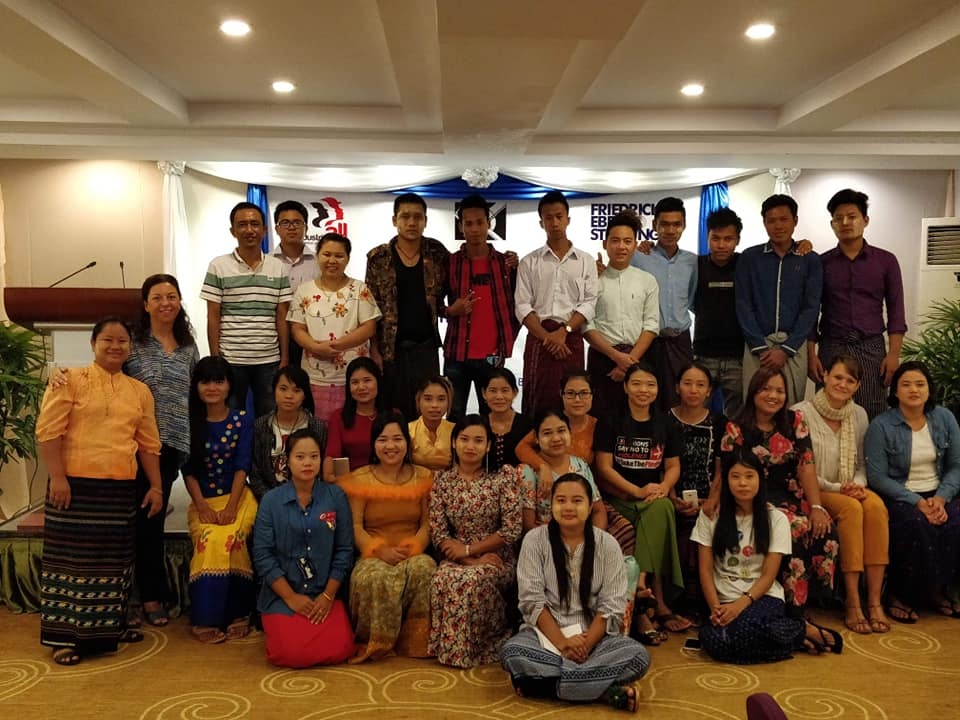Read this article in:
English
28 August, 2018As part of IndustriALL's living wage campaign garment unions in Cambodia and Myanmar met last week on 20 - 22 August 2018 to develop and agree on joint demands and strategy for national sectoral bargaining in the apparel and footwear sector.
Garment unions also discussed and debated brand purchasing practices and their impact on wages and working conditions. The workshops are part of a global programme between IndustriALL Global Union and the Friedrich Ebert Stiftung (FES), which focuses on technical assistance for IndustriALL’s garment affiliates in strengthening their living wage campaigns.
Cambodian textile and garment unions agreed on strategies for both the minimum wage and industry bargaining processes. Wage discussions in Cambodia are at a critical stage. The annual minimum wage adjustment process is about to start while negotiations between unions and employers for an industry agreement linked to the ACT process on living wages are well underway.
ACT process is based on a unique agreement between global brands and retailers and trade unions aimed at transforming garment and textile industry and achieve living wages for workers through industry-wide collective bargaining linked to purchasing practices.
In Cambodia, one of the key issues will be how the industry-wide collective agreement deals with wages, building on the minimum wage. Unions discussed how to ensure that the eventual agreement raises wages to a level that will trigger the commitments made by brands under the ACT process.
As part of the annual minimum wage bargaining, Cambodian unions agreed to meet again to agree a common figure for their wage demand. This will be based on an update to the several criteria established by the unions to assess the amounts workers need to pay for housing, food, health etc.
As consultations with the government and employers continues under the ACT process, IndustriALL Myanmar affiliate, the Industrial Workers Federation of Myanmar and its members from different regions of the country also held a living wage workshop with the focus to better understand sectoral bargaining. Trade unions became legal in Myanmar in 2012. Myanmar’s first minimum wage came into force in 2015 and the minimum wage has reached 4,800 kyats per day (3,25 USD) after a minimum wage campaign was launched. Like in Cambodia, the minimum wage is insufficient to meet workers’ basic needs.
The unions also discussed advantages of a sectoral bargaining versus enterprise bargaining and concluded that increase in productivity should result in better wages and working conditions and better industrial relations in the entire industry through more motivation, more work-life balance, skill training, less turnover, and stronger social peace.
Jenny Holdcroft, IndustriALL assistant general secretary,
“Understanding how brand purchasing practices impact on wages and working conditions in factories is crucial. Through the ACT process, brands have committed to changing how they do business with their suppliers so that wages and conditions are not undermined.”
During the workshops the unions identified brand practices that have the greatest negative impact and must be reformed. Apart from pricing, which must be enough to cover all the costs of employing workers, unions agreed that late orders cause major problems in factories. These include increasing working hours, undermining wages and working conditions and causing high levels of job insecurity through temporary contracts, job losses and even factory closures. The participants called on brands to address these negative impacts through sustainable orders, better planning, setting appropriate prices and working in closer cooperation with factories to ensure that worker rights are respected.





